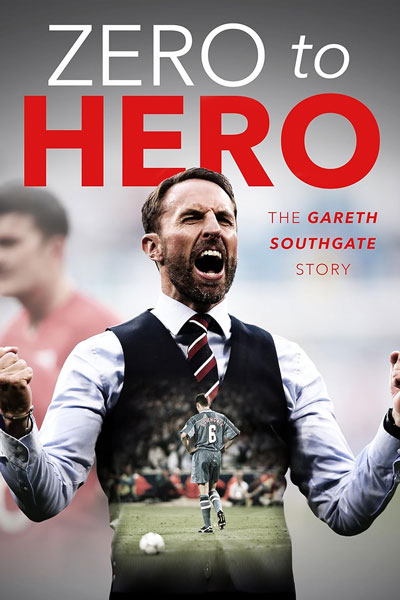

Gareth Southgate is a renowned figure in the world of football, initially as a player but perhaps especially as a manager. Internationally he represented England, earning 57 caps between 1995 and 2004. However, a distinguishing moment for Southgate came in the form of a missed penalty in the Euro 1996 semi-final shoot-out against Germany. A moment that scarred him mentally for a long time. But it’s how he dealt with this, how he used his own experience to improve that of others that is perhaps the most inspiring part of his story.
Growing up, Southgate’s football journey wasn’t without rejection. He was good, an exceptionally talented player who was picked up by various youth teams, but his smaller size meant he was dropped. He had a choice to make then. Either give up on his dream to be a footballer or keep going and play somewhere else. His determination meant he picked the latter and was invited to play for the Crystal Palace youth team.
Missing the penalty in 1996, Southgate found himself hiding from press and facing angry England fans with relentless mocking chants. It’s hard to imagine how this must have felt. For Gareth it meant he was then constantly worried about making a mistake, consequently effecting his performance.
Importantly, as he transitioned into management Southgate took his experience and was determined to shift the way the players thought about the game to be more positive. He nurtured the talent and is well known for his progressive approach to coaching.
In 2016 he was appointed the manager of the England men’s senior team and under his leadership the team went on to reach two European Championship finals, as well as the quarter and semi-final stages of the World Cup - making him one of the most successful England football managers of all time. Despite losses in the final stages, Southgate recognised achievement and always told his players to hold their heads up high. He knew how they would be feeling, and used his experience to build them up, not knock them down.
Southgate teaches us the importance of resilience. To stand up in the tough moments and importantly to come back stronger.
Gareth Southgate – video transcript
Really, I only had one goal in life and that was to play for England.
Always had a love of football from when I was able to kick a ball around. So in my mind, I always had it that I wanted to be a footballer. At school, I was one of the better players. And slowly you get picked up and play for the county and for district. Southampton had a centre near where we lived. And they had sort of twenty local kids that would come and train. And I did that with them for a couple of years. I was physically quite a late developer. And Southampton just had better players, frankly. So they explained that they thought I wasn't going to be big enough, so they released me.
And you have a choice then. You either accept what's being said and that becomes your destiny or you fight back and you battle to prove people wrong. And your mindset and your reaction to those things is your gift really.
Crystal Palace had always monitored what was going on and they started to invite me to train once a week with their youth team. I was one of the better players at Palace but we were a small club. Then got the chance to move to Aston Villa. Within a couple of months, I was selected into the England squad. And to make my debut was a huge moment for me, really.
Life up to that point had always taught me that this is going a bit too well. You know, where's the curve ball coming? The European Championship was incredible. You know, we're hosting and we're into a semifinal. We're playing Germany, which is of course famous rivalry. So the game itself was a real end-to-end rollercoaster. We went ahead really early. They equalise. We go to extra time. And then penalties. And I'd never been involved in a penalty shootout.
One of the coaches came over and said, "Okay, look, if it goes to a sixth penalty, would you, you know, would you take one?" And I just said, "Yeah, absolutely I will." So then it's getting to four-three and four-four. And you know, this is now looking like I'm going to have to take one. Five-four. Five-all. Now, I started to think about, "Oh, hang on. What happens if I miss?" It's about executing a skill under pressure. And I wasn't prepared well enough to execute a skill under pressure.
Once the goalkeepers made the save, then yeah, then you're flooded with all sorts of emotions of goodness, how, you know, what happens now? Yeah, you're just thinking about everybody you've let down, really. Yeah, dismay frankly.
You know, when I look back now, there was no support at that time for what was going to happen. So we drove home on our own, get to our house. All the press are camped outside our house. And you know, basically we kind of hid inside the house for two days. People kept knocking on the door, putting notes through the door. "Would you talk to this paper?” "Would you talk to this magazine?" We didn't want to do any of that.
Of course, the following season, every ground I was going to, people were chanting at how I'd let the country down. And I had a spell with England where I really suffered form-wise because I was worried about making another mistake and until the point I got dropped, so what do I do? I either finish with England and don't play again or I bounce back and fight. And you know, I wanted to keep playing for England. I was back in the starting team for the World Cup in '98. But I knew that my England career was always defined by that moment, really.
Certainly, when I finished playing I wanted to help other people to be a better player than I was. So when the opportunity came up to be the manager of England, initially, real low point for the team, I didn't want to take it because I was scarred by the failure. And I really regretted that because I thought, it's the first time in my life where I've worried about failures of the past. Bizarrely, six weeks later, the job was available again on a temporary basis. I've already established that I'm regretting not being braver in my decisions. And I felt that the team and the country had begun to view playing for England as a real negative. And how do we shift the way that we view being here and the experience of it and make it one that we enjoy? And I'd recognised now over a period of 30 years of working that everybody had insecurities. Even the most successful people I'd seen had failed. But they were just normal people like everybody else.
I find it quite hard to define what success is. You want to constantly improve, learn from what's happened, live to your values. Even the Ronaldos, the Messis, all of them will have been rejected at some point. And I wasn't in that category of talent. And frankly, I wasn't certain I was in the next category of talent. So I knew that I had to maximise what I had.
You can't just, you know, pluck belief or confidence out of the air. I think it's a consequence that you've got evidence of being able to succeed at something. You're going to fail along the way. And you'll be rejected along the way. And so again, you have a choice to how you respond to those moments. So the resilience, the character to come through those moments, to be strong, understanding that everybody else has the same doubts, everybody else has the same insecurities, and that's okay. To win things, it's standing up in the moments where things are really tough that will make the difference.
END CARD
Gareth Southgate became one of the most successful England football managers of all time.
After being capped 57 times for England as a player, he went on to manage the England men’s team for 102 games, leading the team to two European Championship finals, and to the quarter and semi-final stages of the World Cup.
Under his leadership, England won more knockout games in major competitions than every other manager since 1966 combined.
 Zero to Hero
Zero to Hero